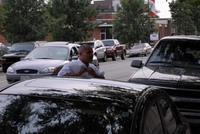Scandals shatter Chicago's troubled police department
Chicago's troubled police department began a new fuss after shown videotapes of angry officers savagely beating civilians and charges that a murder plot was hatched within an elite special operations unit.

Adding to the department's woes is word from federal prosecutors that they are investigating claims that homicide detectives tortured suspects into confessing to murders that landed them on death row in the 1980s.
Not since club-swinging cops in baby-blue helmets chased demonstrators through clouds of pepper gas at the 1968 Democratic National Convention have Chicago police been so awash in trouble.
The biggest shock came Wednesday when federal prosecutors charged special operations officer Jerome Finnigan with planning the murder of another member of the unit to keep him from talking to the government.
"This kind of stuff on Page One is just horrible," and reinforces a misleading stereotype of police, said Roosevelt University political scientist Paul Green, who taught at the police academy for four years.
"The overwhelming 99.9 percent do their job professionally," he said.
But evidence of deep-rooted problems is piling up.
Finnigan, 44, also is one of six members of the special operations unit, created to crack down on gangs and drugs, who are charged with operating a shakedown operation in which they allegedly sought to steal money and illegal narcotics from drug dealers. Prosecutors say they have him on tape weighing the possibility of having someone kill a fellow special operations officer to keep him from becoming a witness against him.
Finnigan and his attorney, Michael Ficaro, declined to comment.
In July, three off-duty officers pleaded not guilty to charges that they beat four businessmen in a bar in a videotaped confrontation.
In another videotaped confrontation, off-duty officer Anthony Abbate was seen apparently beating a 115-pound (52-kilogram) female bartender because she would not serve him another drink. Abbate has pleaded not guilty to a felony charge of aggravated battery.
The quagmire is deepened by five federal lawsuits accusing police and city officials of covering up the torture of murder suspects at the Area 2 detective headquarters under violent crimes Lt. Jon Burge in the 1980s. Burge was fired in 1993 after a suspect in the murder of two officers allegedly was abused while in his custody.
A four-year study by two special prosecutors appointed by a Cook County judge, released in July 2006, found that Chicago police beat, kicked and shocked scores of black suspects in the 1970s and 1980s to get confessions. The report said it was impossible to file charges because the incidents were so old that the statute of limitations had long since run out.
On Wednesday, however, U.S. Attorney Patrick J. Fitzgerald announced the federal government was stepping into the torture case, saying it would seek evidence of "perjury, false statements and obstruction of justice by members of the Chicago police department."
"It's political, it's cultural, it's systemic," said attorney G. Flint Taylor, who represents several former death row inmates now suing Burge and city officials.
Attorney Richard Sikes, who represents Burge in the five civil suits, said after Fitzgerald's announcement that allegations against his client "have been fairly investigated by the special prosecutors who found that charges were not appropriate."
The department has been slow to put its best foot forward. Officers in the news affairs office said only department spokeswoman Monique Bond could comment. Bond did not return three calls seeking comment over two days.
Mark Donahue, president of Chicago's Fraternal Order of Police Lodge 7, said most officers are doing a professional job but the department's reputation has been hurt by the misdeeds of a minority.
"I subscribe to the few-bad-apples theory," Donahue said. "It is also due to the attention that the few bad apples are getting from the media."
The City Council recently revamped the Office of Professional Standards, which investigates charges that police officers abused civilians. Instead of reporting to department higher ups, as it did for years, the office now reports directly to Mayor Richard M. Daley.
Futterman says such investigations in the past were shoddy and rarely resulted in discipline against the officers.
"If they investigated crimes the way they investigate complaints against police officers they would never close a case," Futterman says.
Subscribe to Pravda.Ru Telegram channel, Facebook, RSS!





